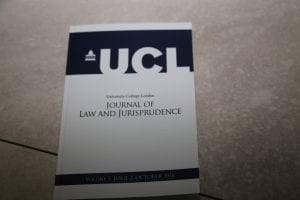Launch of the Oct 2016 New Issue of the UCL Journal of Law and Jurisprudence
By ucqhiry, on 4 October 2016
Last night (3 Oct 2016), the UCL Journal of Law and Jurisprudence launched its latest issue, Issue 5(2). The launch event was held at the offices of Slaughter & May, one of the Journal’s sponsors. Some 50 practitioners, students, academics, UCL graduates, editors, and authors have attended the event.

The new issue, which is fully available (open access) here, is a themed “City Issue” which address various legal aspects relevant to the commercial prevalent reality and the City. The academic and managing editors (Sara Razai Chris O’Meara, and Ira Ryk-Lakhman), who have concluded the role yesterday, wrote the following preface, which offers a taste of the contributions of this recent issue:
Dear Reader, This October issue of the UCLJLJ reflects our commitment to evolve and adapt while upholding the tradition of a biannual publication. The edition you are holding in your hands – or perhaps reading on your screen – continues the tradition of having a themed issue of the UCLJLJ. We have named it the ‘City Issue’. The idea of this theme is to reflect and celebrate the world-class reputation of legal practice in the City of London and the range of legal disciplines that are practised there. Our choice of theme was intentionally broad and left scope for any area of law and jurisprudence. Whether domestic, regional or international, the papers assembled here are a true expression of City legal practice and thought. Equally diverse and broad, the five papers offer an original and topical contribution from both academics and practitioners.

The issue begins in the sphere of European Union law, with an analysis of the effects of mandatory bail-in on creditors’ property rights. Tracy Maguze considers whether bail-in rules interfere with the right to property of bank creditors and if such interference is justified. With particular emphasis on European human rights, she argues that bail-in rules do in fact infringe creditors’ rights to property on the basis of legality and legitimacy. The issue continues with an inquiry into domestic law, being the bookbuilding regime in the UK. Tong Jing Lim examines the UK IPO and price formation process and argues that, despite its flaws, the current bookbuilding regime has significant advantages. Instead of replacing it with an auction system, as proposed by the 2014 Myners Report, the author instead suggests a number of ways to improve the existing process.
The third paper considers the doctrine of relief of forfeiture in the context of international, national and regional loan agreements. Analysing the material adverse change clause in light of recent case law, Michael Kokkinoftas argues that relief of forfeiture could be used by the borrower as a remedy for mitigating the severity of punitive clauses when an event of default is triggered.

The paper that follows addresses short-termism in relation to listed companies in the UK. With emphasis on market behavior and the UK’s legal landscape, Andrea Bowdren argues that short-termism in listed companies should affect regulatory and legislative proposals and that breaking transmission mechanisms is crucial to prevent short-termism in corporate ix decision-making. She offers solutions to combat managerial myopia and to re-focus executive attention on long-term value creation.
The final paper is a unique contribution to this City Issue and reflects the diversity and scope of law in thought and action. It presents a view from practice. Tolek Petch, Associate at Slaughter and May, considers case law in relation to asymmetric jurisdiction clauses in financial contracts. The author offers a comparative analysis of the differences in approach and construction taken by the French and English courts. He concludes that the doubts expressed by the French courts are unwarranted given the good commercial and legal reasons to uphold such clauses.

This short overview shows the range of City-related issues covered in this issue. True to its founding objectives, UCLJLJ remains a journal dedicated to producing high quality papers in the field of law and jurisprudence. We hope therefore that this themed edition offers some useful insights, both theoretical and practical, into law as practised in the City.
Finally, a few last words. After the publication of this issue, we will be handing over to a new editorial team. We have had a great year and are proud of our contribution to this Journal. We would like to acknowledge the hard work of everyone who helped in the formation and publication of this issue. First, thank you to the members of the Editorial Board who have each devoted significant time and energy to reviewing and editing these papers. Without their dedication, this issue would not have been possible. A warm thank you is also due to our Copy Editor, Dr Aislinn O’Connell, who is sadly leaving us. Her help and dedication over a number of years have been invaluable and she will be missed. We are grateful for our long-standing sponsors, Blackstone Chambers and Slaughter and May, and their continuing generous contributions to the Journal. In particular, thanks go to Tom Vickers and Grace Parkinson at Slaughter and May for their collaboration on this issue. Last, but not least, we are thankful for the support of the UCL Faculty of Laws and our Faculty Editor, Dr Daniela Simone.
We hope that you enjoy the read, and wish the 2016/17 board the best of luck!

 Close
Close



